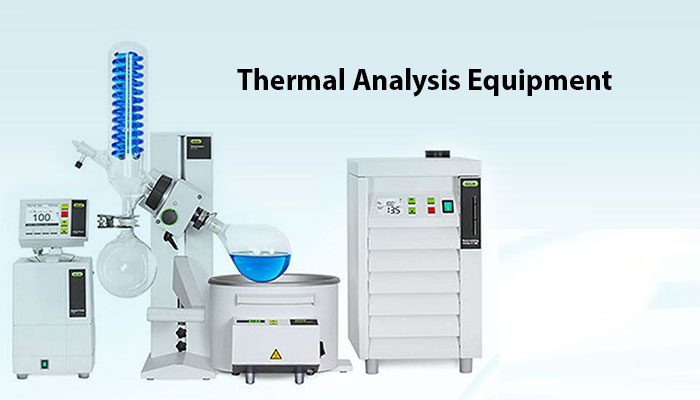
Thermal Analysis Equipment: Types
Thermal analysis is the study of materials as a function of changing temperature. There are several techniques for thermal analysis like Thermogravimetric analysis (TGA) which measures weight changes; Thermal Conductivity, a materials ability to transmit heat; Differential Thermal Analysis (DTA) which measures exothermic and endothermic reactions; Differential Scanning Colorimetry (DSC) which measures the heat required to raise the sample temperature; Dilatometry and Thermomechanical Analysis (TMA) which measure dimensional changes with changing temperature and; Dynamic Mechanical Analysis (DMA), dynamic mechanical thermal analysis (DMTA) which looks at viscoelastic properties of polymers.
Thermal analysis equipment is used to measure and analyze the properties of materials and certain composites at different temperatures. Thermal analyzers are specifically used by laboratories, industrial and diagnostic centers and quality control departments for medical research, polymer/material analysis, and quality control applications, respectively. The infographic presents descriptions and specifications of some common thermal analysis equipment used by these facilities.
Thermal analysis is essential for determining the fundamental properties of a product or material when it is heated, cooled or kept at a constant temperature. Thermal analyzers are used for thermal analysis of materials and to determine changes in their characteristics with a change in temperatures, such as freezing and boiling temperatures, the heat of vaporization, the heat of fusion, etc. There are several types of thermal analyzers, some of the main types include dielectric analyzers, dilatometers, differential thermal analyzers, simultaneous thermal analyzers, thermal conductivity analyzers. Sub-types include thermogravimetric analyzer and thermomechanical analyzers, which allow for thermal analysis. Dielectric analyzers use an oscillating electrical field to investigate the curing behavior of thermosetting resin systems, composite materials, adhesives, and paints. Dilatometers, another type of thermal analyzer measures the volume changes caused by a physical or chemical process. Dilatometers have been used in the fabrication of metallic alloys, compressed refractory compounds, glasses, ceramic products, composite materials, and plastics. See the below infographic to know about various types of thermal analysis equipment that is used to measure different properties of a material. Thermal Analysis is important to a wide variety of industries, including polymers, composites, pharmaceuticals, foods, petroleum, inorganic and organic chemicals, and many others. Properties characterized include melting, crystallization, glass transitions, cross-linking, oxidation, decomposition, volatilization, coefficient of thermal expansion, and modulus. These experiments allow the user to examine end-use performance, composition, processing, stability, and molecular structure and mobility. All our thermal analysis instruments are manufactured to exacting standards and with the latest technology and processes for the most accurate, reliable, and reproducible data available.
